
|
Thomas Holcroft & Sons Ltd.Ettingshall Foundry
|

|
As a child being brought up in the 1950s in the Ettingshall area, the sight of the buildings of Thomas Holcroft and Sons in Ettingshall Road was both impressive and depressing. They were tall, three or four storied, with rows of metal framed windows with small panes of glass that must have been covered with layers of a combination of soot, grime and any other mixture that had been put into the atmosphere by the local stacks during the previous fifty years. Certainly it had been a long time since sunlight had penetrated those windows. It was everyone's idea of what a Victorian workhouse should look like. Even today, whenever I travel down Ettingshall Road towards Monmore Green, I always look left just after crossing the canal bridge and recall the factory buildings that once stood between Ettingshall Road and the canal. I recall my Uncle, Sonny Wainwright, was employed there as a watchman and my dear old Gran Wainwright worked in the canteen. Today it is the site of a large car park to a cash and carry warehouse.
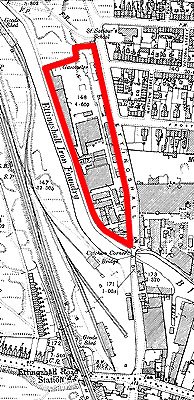 |
| This is the site of Holcroft's works, shown on the 1902 revision of the Ordnance Survey map. The works do not have and connection with the railway to the west but they do have an extensive frontage to the Birmingham Canal Navigations. Ettingshall Road forms the eastern boundary of the site, crossing the canal at Catchem Corner bridge. |
Thomas Holcroft was born in a house in Coseley Street, Bilston. Between 1822-4 he was the Manager at William and John Sparrow & Sons' coal and iron works of Bilston New Mill & Furnaces. In 1834 a trade directory listed him as Agent for the Company. Kelly' Directory for 1870 lists Thomas Holcroft, engineer, iron and brass founder and millwright at his Bilston foundry. The company was also known as a manufacturer of waterworks pumping engines, mill and forge engines.
Holcroft's was one of the larger firms which received a mention in Lawley's History of Bilston, published in 1893. He wrote:
"A hollow-ware works of great size has within the last few years been erected at Ettingshall by Messrs. T. Holcroft & Sons. Some hundreds of hands are here employed - a large addition to the works having been made two years ago. Of this establishment Mr. Harold Holcroft has the active management."
In that year, 1893, the firm was incorporated, Thomas Holcroft becoming Chairman, with his brothers William and Charles, sons Harold, Arthur and Frederick, and his nephew George Harry Holcroft, as well as former Works Manager, A.H.Mould, all as fellow directors. On his death in 1904 Thomas was followed as Chairman by his son Harold who was also the managing Director.
Kelly's 1900 Trade Directory lists the premises at Market Street, Bilston. The foundry in Ettingshall Road was for the manufacture of hollow-ware and hardware.
The range of products produced around 1900 was extensive.
They included:
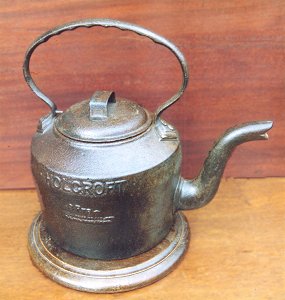 |
(left: a kettle from my collection) |
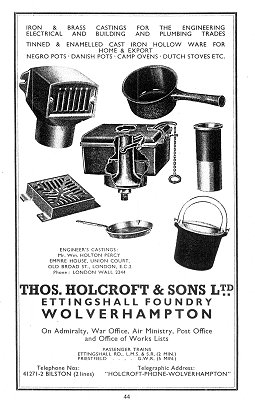 | This advert, from 1950, only mentions domestic hollow-ware but at the time they were also making castings of all sorts. |
| This 40 pint pot is marked "Holcroft" on this side
and "Aga Esse" on the other side, showing that Holcrofts were making
equipment for the famous Aga cookers.
(from Frank Sharman's collection) |
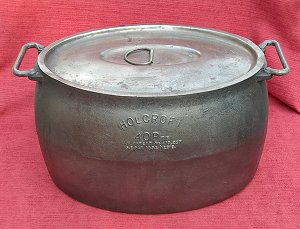 |
A 6 pint pot from Holcrofts. The finish shown in
the photo is certainly not the original.
(from Frank Sharman's collection) |
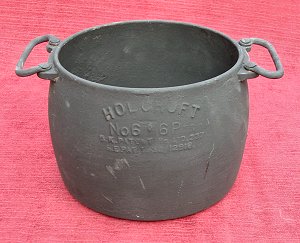 |
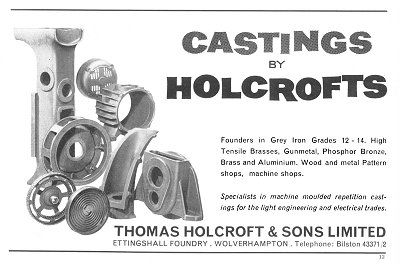 |
This advertisement appeared in the 1967 Wolverhampton Official Handbook. It emphasises castings; but their listing in the Handbook refers to the company as "Manufacturers of flat-bottom cast-iron hollow-ware, and of repetition grey iron and non-ferrous castings". But at this time the end was not far away and the company closed in 1969. |
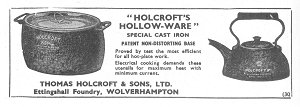 |
|
In 1903 a serious fire occurred at the pot and pan factory. Several men died, including a fireman. During the First World War the company manufactured hand grenades and other cast iron products for use at the front. In 1928 Harold Holcroft relinquished his position of Chairman due to ill health and was followed by Frederick Holcroft, his younger brother. Mr. R. H. Halbeard was appointed Managing Director and remained until his retirement. |
 Click image to return to the industry front
page
Click image to return to the industry front
page